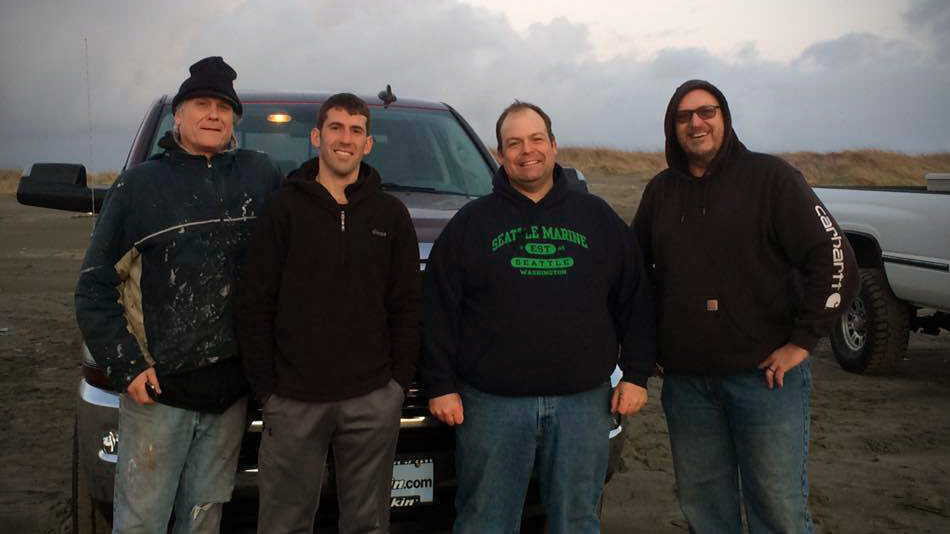In 2016, Rick Anderson (right) shared a photo with fellow ILWU members with the caption, ‘Trust all these guys with my life.’
In January, Local 4 hosted a retirement meeting for 4th generation ILWU longshore worker Rick Anderson. Anderson spoke with the Dispatcher, and the first part of this story is printed in the February issue and is available online at https://www.ilwu.org/local-4-member-rick-anderson/.
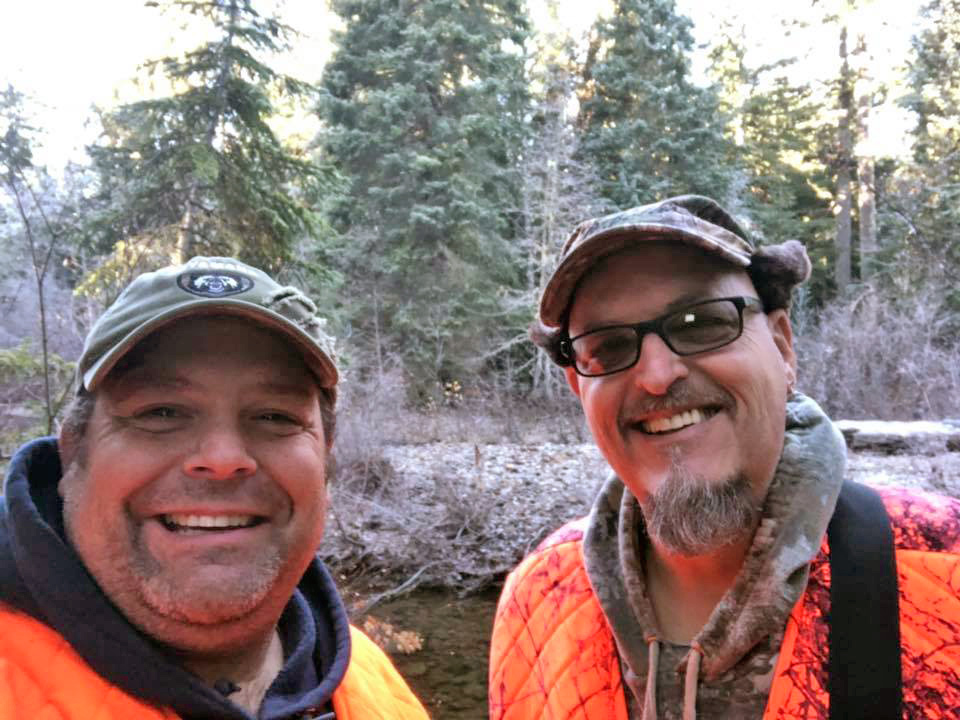
Cager Clabaugh, former Local 4 President, and Anderson elk hunting in 2018.
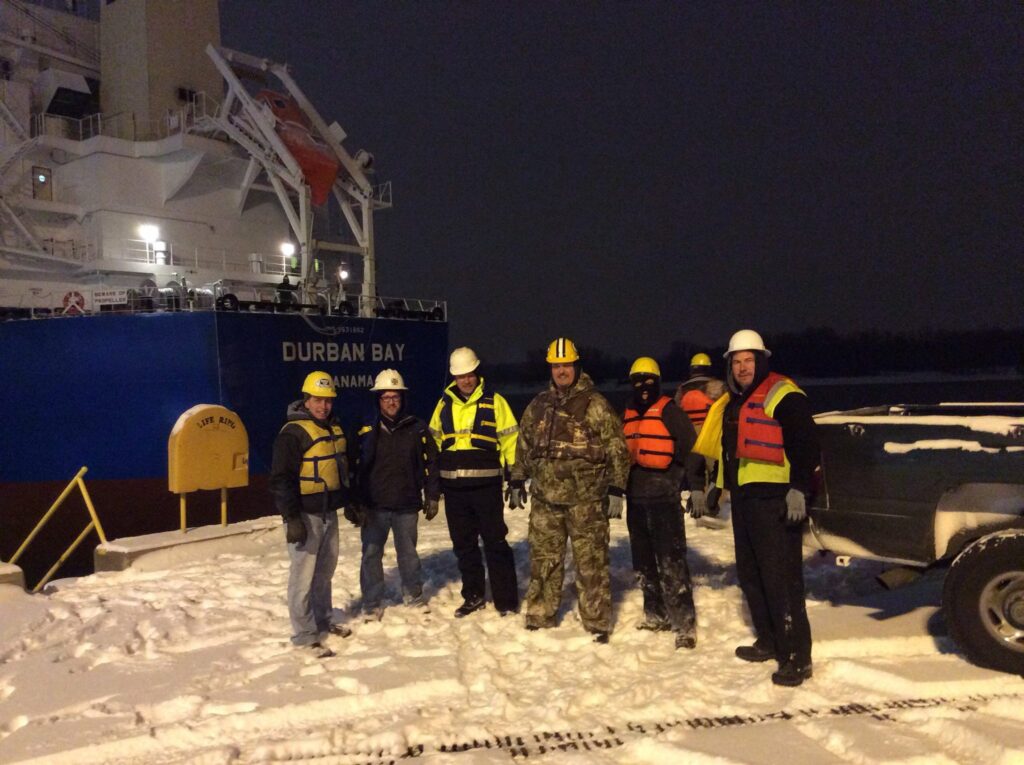
ILWU Local 4 working in the snow: Anderson, Mike Baur, Clabaugh, Skip Fox, Eric Ransay, Robert Shelton.
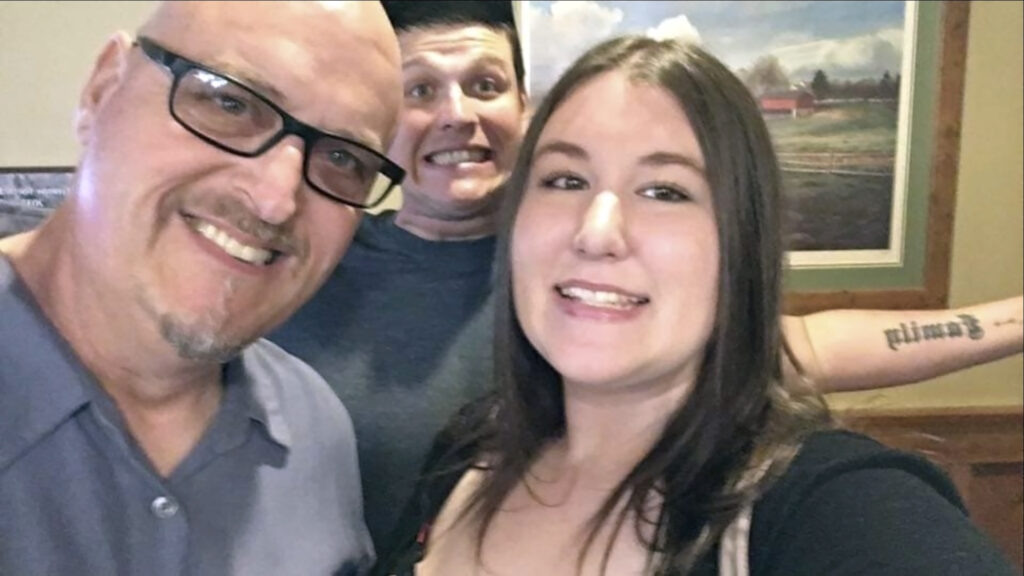
Anderson’s kids, Brandon and Brandi, are working as casuals on Vancouver’s waterfront, making them the 5th generation.
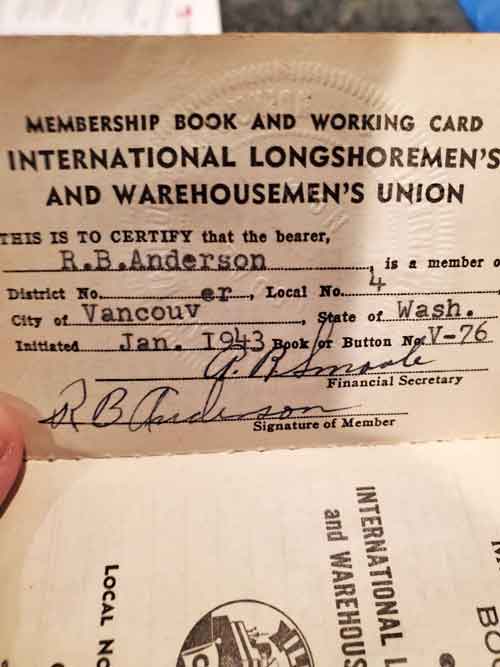
1943 book of Anderson’s grandfather, Richard, who fought with Anderson’s great-grandfather, Loa, in the 1934 Strike.
‘That’s where our power is’
One aspect that Anderson values in the ILWU was the way the older generations would mentor younger workers, including himself when he started on the docks in Vancouver, Washington, 28 years ago.
“The old-timers showed me the ropes; it was great,” he said. “They always watched out for my safety while showing me what needed to be done.”
Today, Anderson said he is inspired by young ILWU workers in Tacoma who are taking the initiative to organize themselves, learn the history of the union, and actively educate others.
“I see the ILWU Young Workers Committee, I’m so proud of those guys,” he said. “I wish that all locals up and down the coast would do that. The thing that I’m not seeing anymore is teaching the young guys solidarity. I’ve been on the docks for 28 years. I know that if somebody gets in trouble, or if I ever had trouble, that the brothers would stand up for me. I remember a guy they were threatening to fire. I said, ‘If you fire him, you’re firing me, and your ship is going to sit there.’ A lot of our guys don’t know our history, and that’s where our power is.”
Cager Clabaugh, former President of Local 4 and longtime friend of Anderson, said, “When I was an officer, I’d try to get people to go to barbecues, rallies, lobby days. When it’s hard to find people to go with you, you’d know Rick would go: ‘Hey, you want to go to a rally this weekend?’ ‘Absolutely.’ ‘Want to go to lobby day?’ ‘No, but I will.’ You could always count on him.”
‘He won’t back down’
“We’ve got people in our locals that are openly voting for anti-union legislators,” said Anderson. “It blows me away that people are voting against their own self-interest. Maybe if they went to lobby days, they would see the importance of pro-worker legislators. We talked to (then-Governor) Gary Locke in 2002 about not putting the National Guard on the docks. It was important for the governor to see us. I just don’t understand the mentality of voting against your interest.”
Clabaugh said, “Rick is always keeping up on politicians and bills, stuff they’re trying to do in DC or Olympia – free trade agreements, anything having to do with unions. I’ll call Rick, and he’ll tell me why it’s a bad deal or a good deal. He’s just a smart guy. Information, he loves it.”
During the 2013 UGC grain lockout, Anderson and Clabaugh traveled to Olympia on behalf of locked-out workers to ask legislators to sign onto a letter urging UGC to get back to the negotiating table. When they approached one Democratic legislator, Anderson said, “This guy had the balls to say, ‘well, you’re not in my district, so I don’t know.’” Anderson responded, “‘Well that’s funny, because I’m on the PAC, and I remember in the last election, getting a request from you for money from our local. And we’re not in your district!’ I got chewed out by our lobbyist, saying, ‘you can’t talk to them like that.’ I said, ‘You know what? I guess I can.’ And he ended up signing the letter. I’ll give respect where respect is given back.”
“I’ve never seen Rick be put into a position where he wasn’t able to best the person he was dealing with,” said Clabaugh. “He’s a smart, aggressive, dedicated union man. Rick knows his stuff, and he won’t back down.”
Importance of solidarity
ILWU dockworkers often support other unions’ picket lines, and Anderson recalled ILWU being welcomed as they traveled to picket lines throughout the Columbia River and along the Oregon and Washington coast.
“We supported the Teamsters at Tillamook Cheese, Locals 4 and 21. They had been on the line for a month,” he said. “The next day they got a contract because we raised hell down there. At Powell’s [the bookstore in Portland being organized by Local 5], I don’t know how many hours we spent there. The Nabisco strike in Portland, we let them know ILWU had their backs. Nurses, teachers … we bounced around the school district to make sure teachers knew the ILWU had their backs. UFCW, Freightliner, you name it.”
Anderson said of ILWU workers, “We’re always welcome with open arms. They love it when longshoremen show up. We’re always respectful of their rules; I ask them what they need. ‘Do you need somebody to be a jerk? Push it right to the edge, or go over the line?’ We always respect what another union wants.”
“Even though this saddens me, other unions don’t do the same for us.” he said. “When we were locked out at UGC, we had IBEW Local 48 crossing our picket lines in a bus driven by SEIU. The ships were docked with river pilots who were supposed to be union, and the grain inspectors that we went to bat for so many times, they crossed our lines. It makes me sad when you don’t see the solidarity in return. And that’s one of the reasons why we left the CLC (Central Labor Council). I told them for months that the lockout at UGC was coming, and I warned them, ‘don’t anybody in this room, and the locals you represent, don’t cross our picket lines.’ Well, right away, the IBEW did. So the CLC was always held at our hall, and I kicked them out. I said, ‘we don’t allow scabs in our hall.’ The CLC had to find a new place to have their meetings.”
“IBEW Local 125, on the other hand, they just left they left their tools at the elevator” when UGC locked out ILWU, Anderson recalled. “Finally, six months into the lockout, they came to us and said, ‘there are some tools in there that we really, really need. We’re not going to cross your picket line.’ We said, ‘Go ahead, get your tools.’ They said, ‘We’re not going to do any work in there.’ Those guys were awesome. I have nothing but respect for Local 125. Local 48, not so much.”
Anderson publicly challenged building trades union leaders on the lack of solidarity he saw. “I never understood that – trying to grab our jurisdiction,” he said. “At the state CLC, I said, ‘The building trades are trying to steal our work. You guys have all of America, and we’ll help you wherever those jobs are. But leave the docks alone; that’s ours.’ I just don’t understand that mentality.”
‘If we would all just stick together’
Like many Local 4 workers, Anderson was the fourth generation in his family to work in the UGC elevator and worked as a console operator and locomotive driver. The elevator was built in 1934, the same year the Andersons and thousands of other dockworkers and their supporters along the West Coast fought to form the union and ensure good jobs on the waterfront.
So when UGC stopped negotiating and locked out ILWU workers in 2013, Locals 4, 40, and 92 picketed for nearly 18 months, demanding a new contract and to return to their jobs. Anderson was one of several workers who were arrested during clashes between the union workers who formed a picket line and the anti-union forces who were paid to cross it.
“Myself and Brad Dyer and Bob Poppe, we ended up all going to jail” over a crosswalk incident, said Anderson. “They took us in to do a big show. [Union-busting firm] Gettier were in constant contact email and text with Vancouver police. Go figure, an out-of-state agency in touch with our local police force.”
“The two biggest threats to our union right now are legislation – anti-union politicians – and jurisdiction,” he said. “And that’s attacks from other unions, unfortunately. There’s so much that could be accomplished if we would all just stick together.”
“I wish that everyone had the moral compass, and the sense of duty to your union, that Rick has,” said Clabaugh. “When you have a guy who’s intelligent like that and knows how far he can push things, and can back up everything he says and is quick-witted – I wish I had those qualities!”
Defying stereotypes
Anderson retired in November due to a diagnosis of Frontotemporal Dementia last year, and is spending time with his wife, Carla, their grown children, Brandi and Brandon – who are both casuals in Vancouver – and his granddaughter, Paisyn. In Part One of this interview, Anderson explained that the life expectancy for his condition is 4-5 years, and that he’s decided to enjoy the time he has.
Anderson remains active on social media, where he and Clabaugh champion viewpoints that seem contrary to stereotypes: They are both straight, white men who drive pick-up trucks and hunt, yet they regularly post progressive messages in support of rights for LGBTQ+ people, women, racial minorities, and sensible gun reform.
“Rick drives a truck, he was in the Navy, he’s a big guy and he loves to hunt,” said Clabaugh. “All of these things you don’t necessarily attribute to progressive guys, but he’s one of the most progressive guys I’ve ever met in my life.”
Anderson said, “It’s occurred to me, LBGTQ people have been activists most of their lives. Maybe that’s why I have so much respect for them.” And three decades ago, “it was because of a gay couple that Carla and I got together,” after the two men at the mill where they all worked helped set up the first date between Rick and Carla.
On immigration, Clabaugh recalls when Anderson called him after anti-immigration politicians flew and bused immigrants to blue states in a political stunt. “Rick called and said, ‘did you hear this? They lied to get people on the bus in the first place, and rather than progressives flipping out, they found them places to stay, clothes and food. That backfired on them. They look like a bunch of [fools].’”
On the topic of gun legislation, Anderson said, “I’m a hunter, but I don’t need 30 rounds to go deer hunting. It’s bullshit. … They’ve been saying, ‘they’re going to take our guns’ since Clinton was in office. It’s ridiculous. How many school kids do we have to sacrifice? It’s maddening. I see people that think one-dimensional when it comes to voting, and it’s so much more than one issue.”
Clabaugh, who described himself as “not a big hunter,” recalled a time when Anderson invited him hunting.
“Rick had been scoping a spot out, and he said, ‘I’m going to put you here; it’s the best spot in the woods,’” said Clabaugh. “After a while, I’m hearing gunshots in every direction, and I’m thinking, ‘I can hear at least five better spots.’ Pretty much right after I thought that, a deer came running through the woods, shaking its head and trying to get a branch out of its antlers. It was running straight at me and, well, I say it was self-defense. Rick came running out after and said, ‘I told you this was the best spot in the woods!’ That says what kind of person Rick is. He’ll give up the best of anything to make someone happy.”
Clabaugh continued, “I haven’t had too many friends like Rick, guys who will drop anything at a moment’s notice and help you with whatever you need. He’s completely selfless; he doesn’t want anyone to make a big deal about it. But he’s the best at everything I’ve seen him do.”
– Jennifer Sargent Bokaie
# # #

